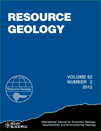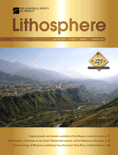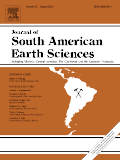
BOLETIN GEOLOGICO Y MINERO
Scope & Guideline
Bridging Academia and Earth Science Expertise
Introduction
Aims and Scopes
- Geotechnical and Geophysical Studies:
The journal frequently publishes studies focused on geotechnical properties of soils and rocks, as well as geophysical methods for subsurface exploration, highlighting the importance of these techniques in mining and construction. - Hydrogeology and Groundwater Management:
A significant portion of the research addresses hydrogeological themes, including aquifer characterization, groundwater recharge, and the impact of human activities on water resources, showcasing the relevance of sustainable water management. - Environmental Impact and Recovery:
The journal includes articles related to the environmental consequences of mining activities, as well as strategies for remediation and recovery of affected areas, emphasizing the balance between resource extraction and ecological sustainability. - Paleontology and Geobiology:
Research on paleontological findings and their geological contexts is a core theme, contributing to the understanding of historical biodiversity and geological processes. - Art and Geology Interdisciplinary Studies:
Unique to this journal, there is a focus on the intersection of geology with art, examining how geological themes influence artistic expressions and cultural heritage.
Trending and Emerging
- Geothermal Resources Exploration:
There is a notable increase in research related to geothermal exploration and the integration of geophysical methods, reflecting the growing interest in renewable energy sources and sustainable resource management. - Groundwater Contamination and Management:
The journal is increasingly publishing studies on groundwater contamination, management, and the impacts of climate change on aquifers, underscoring the urgent need for sustainable water resource practices. - Interdisciplinary Approaches to Environmental Issues:
Emerging themes include interdisciplinary studies that combine geology with social sciences, art, and environmental policy, indicating a broader perspective on geological research and its societal implications. - Impact of Climate Change on Geological Processes:
Research examining the effects of climate change on geological processes and resource availability is on the rise, highlighting the relevance of geology in understanding and mitigating climate-related challenges. - Technological Innovations in Geoscience:
There is an increasing focus on the application of new technologies, such as remote sensing and advanced modeling techniques, in geological research, reflecting the trend towards data-driven and innovative approaches.
Declining or Waning
- Traditional Mining Techniques:
There seems to be a reduction in publications focused solely on traditional mining techniques and practices, as the field increasingly emphasizes sustainable and innovative methods. - Historical Geology:
Research centered on historical geology, particularly studies that do not connect to contemporary applications or environmental considerations, is becoming less frequent, indicating a shift towards more applied geoscience. - Geological Mapping without Modern Tools:
Papers that focus on geological mapping using outdated methodologies, without integration of modern geospatial technologies, are less prevalent, reflecting a move towards more advanced and precise geological investigations.
Similar Journals

Minerals
Fostering groundbreaking research in mineral resources.Minerals, an esteemed open-access journal published by MDPI, has been at the forefront of advancing knowledge in the fields of geology, geotechnical engineering, and engineering geology since its inception in 2011. With an E-ISSN of 2075-163X, this journal aims to foster innovative research and disseminate critical findings that influence both academia and industry practices. Based in Switzerland, Minerals has made significant strides in its impact, evidenced by its 2023 Scopus rankings placing it in the 74th percentile in Geology and 63rd percentile in Geotechnical Engineering. The journal, which will continue to publish until 2024, encourages submissions that explore the multifaceted aspects of mineral sciences, highlighting the importance of sustainable practices and advancements in technology. Researchers, professionals, and students are invited to engage with this vital resource, which not only contributes to the expansion of geological knowledge but also supports the global understanding of mineral resources.

RESOURCE GEOLOGY
Pioneering Discoveries in Earth SciencesRESOURCE GEOLOGY, published by WILEY, is a peer-reviewed journal that serves as a vital platform for the dissemination of innovative research in the fields of geology and geochemistry. With an ISSN of 1344-1698 and e-ISSN 1751-3928, the journal has steadily contributed to the academic community since its inception in 1996, continuing through its planned convergence in 2024. With a Q3 ranking in both Geochemistry and Petrology and Geology categories, RESOURCE GEOLOGY is positioned within the competitive landscape of Earth and Planetary Sciences, ranked 164th and 93rd in its respective categories on Scopus, reflecting its significant contribution to the body of knowledge in these fields. While not an open-access journal, it provides access to essential research that advances our understanding of natural resources and geological processes. The journal is dedicated to publishing high-quality articles that appeal to researchers, professionals, and students looking to deepen their insight into the intricate interplay between geological phenomena and resource management.

GEOLOGIA CROATICA
Exploring the Depths of Geological KnowledgeGEOLOGIA CROATICA is a distinguished open-access journal published by the Croatian Geological Survey, dedicated to advancing the field of Earth and planetary sciences. Since its inception in 1992, this peer-reviewed journal has become an essential resource for researchers, professionals, and students interested in various aspects of geology. With its robust impact factor and a prestigious place in Scopus rankings, ranking 127th out of 321 in Geology and 77th out of 159 in miscellaneous Earth and Planetary Sciences as of 2023, GEOLOGIA CROATICA maintains a strong international presence. It provides a platform for the dissemination of critical research findings, promoting collaboration and knowledge sharing among the global scientific community. By focusing on high-quality manuscripts that cover geological processes, hazards, and resources, this journal is pivotal for anyone looking to contribute to or expand their understanding of geological sciences. The journal's commitment to open access ensures that invaluable research is accessible to all, fostering a more informed and scientifically engaged society.

Moscow University Geology Bulletin
Elevating Geological Research to New HeightsMoscow University Geology Bulletin, published by SPRINGER INT PUBL AG, is a prominent platform for disseminating critical research in the field of Earth and Planetary Sciences. With an ISSN of 0145-8752 and an E-ISSN of 1934-8436, this journal is well-regarded for its contributions to diverse geological studies and interdisciplinary advancements that shape our understanding of the planet. The journal has established itself in the academic community, particularly noted for its ranking in the Q3 category within Earth and Planetary Sciences as of 2023. Despite its limited open-access options, the Moscow University Geology Bulletin remains an essential resource for researchers, professionals, and students through its well-curated articles and synthesis of geoscientific knowledge. With annual volumes converging from various years, including significant years like 2012 to 2024, it aims to uphold its mission of fostering scholarly dialogue and innovation in the geosciences.

GEOLOGICA ACTA
Exploring the depths of geology with global insights.GEOLOGICA ACTA is a distinguished open-access journal dedicated to the field of geology, published by Universitat de Barcelona since its inception in 2003. With an impact factor that reflects its relevance in the academic community and a commendable Q2 ranking within the Earth and Planetary Sciences category, this journal is committed to disseminating high-quality research that spans various aspects of geological sciences. The journal's broad scope encompasses both theoretical and applied research, making it a vital platform for researchers, professionals, and students alike to share their findings with a global audience. With its Open Access policy, GEOLOGICA ACTA ensures that all published articles are freely accessible, fostering collaboration and innovation in the geological community. Based in Barcelona, Spain, at the Geociences Barcelona (CSIC), it plays a pivotal role in connecting scholars from diverse backgrounds and advancing the field of geology through rigorous peer-reviewed articles.

Lithosphere
Pioneering Open Access Research in Earth Sciences.Lithosphere, published by GEOSCIENCEWORLD, is a premier open access journal that has been at the forefront of geological research since its inception. With the ISSN 1941-8264 and the E-ISSN 1947-4253, this journal serves as a vital resource for researchers, professionals, and students interested in Earth and planetary sciences, particularly in the field of geology. Its impressive ranking of Q2 in the 2023 category indicates its vital role in disseminating high-quality, impactful research. The journal’s commitment to open access since 2018 enhances its reach, providing global accessibility to cutting-edge studies that span a diverse range of geoscientific topics, from tectonics to sedimentology. With Scopus Rank #88 out of 321 in Earth and Planetary Sciences, it offers a strong platform for scholars to share their findings and engage with the latest advancements in the discipline. As the journal continues its convergence from 2009 to 2024, Lithosphere remains a crucial publication for those striving to deepen their understanding of Earth's systems.

Geopersia
Connecting Scholars to Shape the Future of Geosciences.Geopersia is a prominent academic journal published by UNIV TEHRAN, focusing on the interdisciplinary fields of Earth-Surface Processes, Geology, and Geochemistry and Petrology. With an ISSN of 2228-7817, this journal aims to disseminate high-quality research from 2017 to 2024, showcasing innovative studies that contribute to the understanding of geological phenomena. Despite the absence of an open access model, Geopersia maintains a significant scholarly presence, reflected in its categorization within the Q3 and Q4 quartiles in several related fields for 2023. The journal has garnered attention in the academic community, currently ranked in the 43rd percentile for Earth-Surface Processes and 41st percentile for Geology according to Scopus rankings. Researchers, professionals, and students are encouraged to engage with this valuable resource, which not only promotes comprehensive exploration of geological sciences but also fosters collaboration and discussion among experts across the globe.

Boletin de Geologia
Your Gateway to Cutting-Edge Geological Research.Boletin de Geologia is a prominent open-access journal published by UNIV INDUSTRIAL SANTANDER, dedicated to advancing the field of Earth and Planetary Sciences. Since its transition to open access in 2000, this journal has provided a platform for researchers to disseminate their findings and engage with the global scientific community. With an ISSN of 0120-0283 and an E-ISSN of 2145-8553, it is indexed in Scopus and has secured a notable Q3 ranking in the category of miscellaneous Earth and Planetary Sciences as of 2023, reflecting the impact and relevance of its published articles. The journal's geographical scope, rooted in Colombia, allows it to highlight significant geological research pertinent to the region while also contributing to global discussions. Scholars and practitioners interested in innovative research within this field will find Boletin de Geologia an invaluable resource for unlocking knowledge and fostering collaboration in the geological sciences.

GEOLOGICA BELGICA
Unveiling the Secrets of Our Planet, One Article at a TimeGEOLOGICA BELGICA is a distinguished open access journal dedicated to advancing the field of Earth and Planetary Sciences, published by Geologica Belgica Luxemburga Scientia & Professionis. With an ISSN of 1374-8505 and E-ISSN of 2034-1954, the journal has been a beacon of knowledge since its establishment in 1998, ensuring the broad accessibility of crucial research findings. Based in Brussels, Belgium, the journal is recognized for its impactful contributions and has achieved a commendable Q2 ranking in the Earth and Planetary Sciences category for 2023. This makes it a vital resource for researchers, professionals, and students alike, encouraging the dissemination of cutting-edge research. Spanning a diverse range of topics within its scope and converging from 2007 to 2024, GEOLOGICA BELGICA remains committed to fostering dialogue and collaboration among earth scientists globally, further enhancing its relevance and influence in this essential field of study.

JOURNAL OF SOUTH AMERICAN EARTH SCIENCES
Exploring the Depths of South American GeologyJOURNAL OF SOUTH AMERICAN EARTH SCIENCES is a premier interdisciplinary journal dedicated to publishing high-quality research in the fields of Earth-Surface Processes, Geology, and Paleontology, making it an essential resource for scientists and researchers focused on South American geology and its diverse geological phenomena. Published by Pergamon-Elsevier Science Ltd in the United Kingdom, this journal has been instrumental in disseminating groundbreaking studies since 1988, showcasing contributions that push the boundaries of knowledge in Earth and Planetary Sciences. With an impressive Scopus ranking—positioning it in the 74th percentile for Paleontology and 71st for Geology—this journal not only reflects robust academic quality but also its commitment to addressing critical geological challenges in South America. Researchers will appreciate its objective of advancing understanding of geological processes while providing insights into past, present, and future Earth environments. Although available through traditional subscription models, the journal's vast repository of articles enriches the academic landscape, facilitating the sharing of vital research among professionals, students, and geological practitioners.